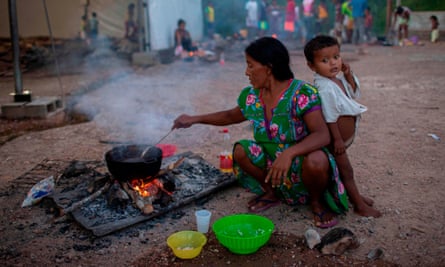Fears and doubts continue to swirl in Brazil days after President Michel Temer put the army in charge of highways and the Venezuelan border as his government grapples with an escalating migrant crisis and rising tensions. Tens of thousands of Venezuelans fleeing a collapsing economy, hunger and skyrocketing inflation have entered the country.
Temer’s move last Tuesday came weeks after a judge temporarily closed the border in the state of Roraima and 10 days after demonstrators in the town of Pacaraima – worst hit by the crisis – trashed migrants’ camps and torched their possessions, causing more than a thousand to flee back across the border. But the state governor called the army presence “insufficient”, critics described it as a “Band-Aid” and some Venezuelans in the town said they still feared further attacks.
“It is a short-term, easier solution. Instead of improving the reception of refugees, you leave it for security services,” said Bruno Magalhães, a professor of international relations at Rio’s Pontifical University. In May, Brazil’s human rights council – a government body – expressed concern over the “militarisation of the humanitarian response to the flow of Venezuelans”. The army helps run Roraima’s 10 shelters and is to open two more next month. It also supplies food and medical care.

According to the UN, 2.3 million Venezuelans have left their failing country – whose leftist president, Nicolás Maduro, survived an apparent assassination attempt by drone last month – to head to Peru, Colombia, Ecuador and Brazil. According to figures from Brazil’s federal police published in June, 120,000 migrants have entered via Pacaraima in the last two years. About half are still in Brazil.
Magalhães said the government should reduce the number of people sleeping on the streets, improve specialist attention for Venezuelans, who often lack documents, and speed up relocations to other states.
Fabiano Coelho, 37, a pharmacist in Pacaraima, said he had not seen more soldiers since Temer’s decree – but more police and national guard had been visible since the 18 August disturbances. Wilha Melo, 21, a school transport administrator who took part in the demonstration, said many locals still wanted the migrants to leave. “People are calmer with the decree but they say it won’t influence anything and the Venezuelans will keep coming.”
A Brazilian army spokesman said 300 soldiers were joining 270 already at the Venezuela border and another 100 near Roraima’s border with Guyana. The army could now intervene in the event of more violence.
“The power of common police has now been added,” he said.
The Pacaraima disturbance began after unconfirmed reports that a businessman had been beaten and robbed by Venezuelans. As crowds chanted “Brazil is ours”, stones were thrown at migrants – some of whom were sheltered by Brazilians – and a digger destroyed an outdoor stage used as a camp. Local media have reported isolated attacks in other Roraima towns.
Roraima has a population of about half a million, and its health and education services are being strained by the Venezuelans. Those who can’t find space in shelters live on the streets. Others crowd into cheap accommodation, like Nerve Bermudez, 43, and her daughter, Neukaris Maita, 20, who share a house in Pacaraima with 12 others. Formerly a secretary, Bermudez now works as a hairdresser, earning about £1.70 a day. “I don’t leave the house any more because I’m scared,” she said.
The numbers crossing the border have halved from 800 a day before the Pacaraima attacks, the army said. But the atmosphere remains tense. Roraima’s state government says health clinic attendances increased 6,500% last year, and crime has risen 132% since 2015. Governor Suely Campos wants the government to refund the £34m the state has spent on health, education and security since the crisis. She also wants a field hospital in Roraima’s capital, Boa Vista, and more Venezuelans relocated internally – so far, about 1,000 have moved on to other states.
Oliver Stuenkel, professor of international relations at São Paulo’s Getulio Vargas Foundation, said Temer’s 3% approval rating and next month’s general election limited the president’s room to manoeuvre. He welcomed Ecuador’s call for a regional meeting to discuss the crisis this month and said governments should standardise border procedures, monitor migrant flow and set up a fund to compensate the worst-hit regions, writing in an article for Americas Quarterly magazine. “This is not going away any time soon,” he said.
Additional reporting by Emily Costa in Pacaraima
